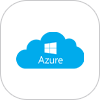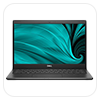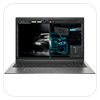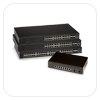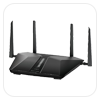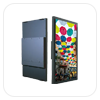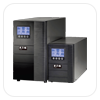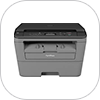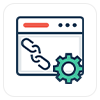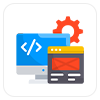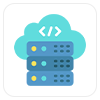
You would not leave your office door open at night, would you? Well, the same applies to your network. Here comes the hardware firewall: one of the strongest lines of defense against cyberattacks.
So, what’s a hardware firewall? Don’t worry; we are here to explain it to you!
Imagine a Security Guard for Your Network
Think of your business network as a house with many doors. Every piece of equipment that is on your internet- computers, laptops, servers, or printers– is another door for entry. Then imagine a very strict and effective security guard at each of these doors- verifying and checking the “credentials” of anyone coming in or going out, letting normal traffic through, and shutting out anything unauthorized or suspicious. In extremely simple terms, this guard is the hardware firewall for your network: a physical appliance, a hardware component that exists between the internal network of your company and the external world, primarily the internet, and attempts to keep an eye on the traffic flow of network based on some pre-defined set of rules regarding the security system.
The Hardware Firewall: Why It Needs to Be Added for Your Business
Today, having a software firewall is like locking your front door but leaving all the windows open. The following are reasons why a hardware firewall needs to be bought for your business:
Network-Wide Protection: It is similar to a gate that secures the entire network, blocking all the devices connected to it at one time from outside threats. This becomes an essential feature when your company expands and has more devices connected to the internet.
First Line of Defense: Malicious traffic is blocked even before it attempts to penetrate individual computers and servers. Along the way, such prevention significantly helps minimize the risk of infection from malware, data breach, and other types of attacks.
Exclusive Performance: Hardware firewalls have been designed exclusively for network security. They contain specialized processors and resources, which implies that there is excellent performance with extremely low latency on your network speed.
Single Point of Management: Setting up security rules and monitoring network activity occurs at a single point, which simplifies administration for your IT staff and/or managed services provider.
Additional Security Features:
Additional security features you get from most hardware firewalls, apart from just filtering traffic, are:
Intrusion Prevention Systems: Real-time scanning of all incoming traffic for possible patterns of malice on an ongoing basis and blocking possible intrusions automatically.
VPN Support: Allowing employees to create secure remote access or to link several offices in a secure manner.
Content Filtering: Visiting websites that consist of inappropriate or unsafe content, unproductive from the employee’s perspective, and dangerous due to malware downloads.
Stateful Packet Inspection: Examining a whole network connection in association with another, rather than examining packets individually, to identify and prevent more advanced attacks.
Selecting a Hardware Firewall for Your Business
Choosing the best hardware firewall will depend on numerous factors that are specific to your business:
Size of Your Business: The number of devices and employees connected to your network would determine how much capacity and performance a firewall would require.
Network Traffic Volume: Companies with heavy internet loads require a firewall that can handle that load without becoming a bottleneck.
Specific Security Needs: The kind of data you handle, compliance needs, and the level of security your business requires.
Budget: Hardware firewalls have a broad price range. Determine a budget and then find the best solution within that budget.
Technical Skills: Take into account if you have IT staff in-house to handle the firewall or if you will have to depend on another managed service provider.
Main Points to Keep in Mind While Implementing a Hardware Firewall:
Proper Configuration: A firewall will only work properly if it is implemented with the right set of security rules. This needs planning to realize your network traffic pattern.
Keep It Updated: As with any other software, the firmware of the firewall needs to be updated from time to time to close any loopholes and to make it run at its best.
Combine with Other Security Measures: Hardware firewalls are an important component in the security configuration, but cannot and should not be depended upon alone. They need to be paired with robust passwords, employee training, antivirus software, and frequent backups to provide complete protection.
Conclusion
A hardware firewall is not merely technology; it’s an investment in the security and continuity of your company. It’s a gatekeeper, protecting your valuable data and locking down the safe environment online. The cost invested at the beginning will look fantastic compared to what’s lost at a data breach or cyberattack.
Give yourself a little time to review your business’s security requirements and learn about some of the hardware firewall options that are available. By taking what is perhaps the most important security step, you’re already creating a digital environment that will serve to safeguard your business for decades to come.

































